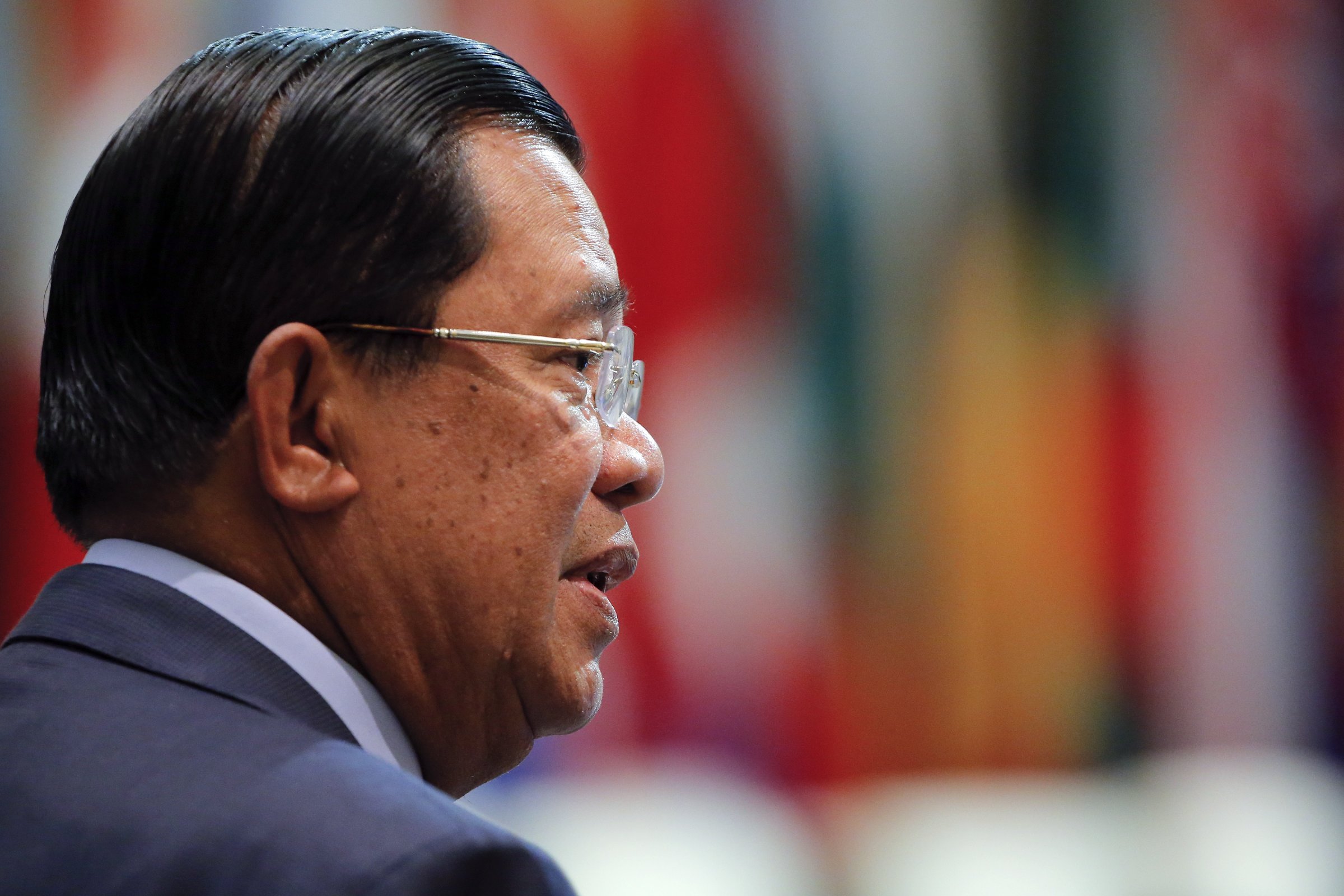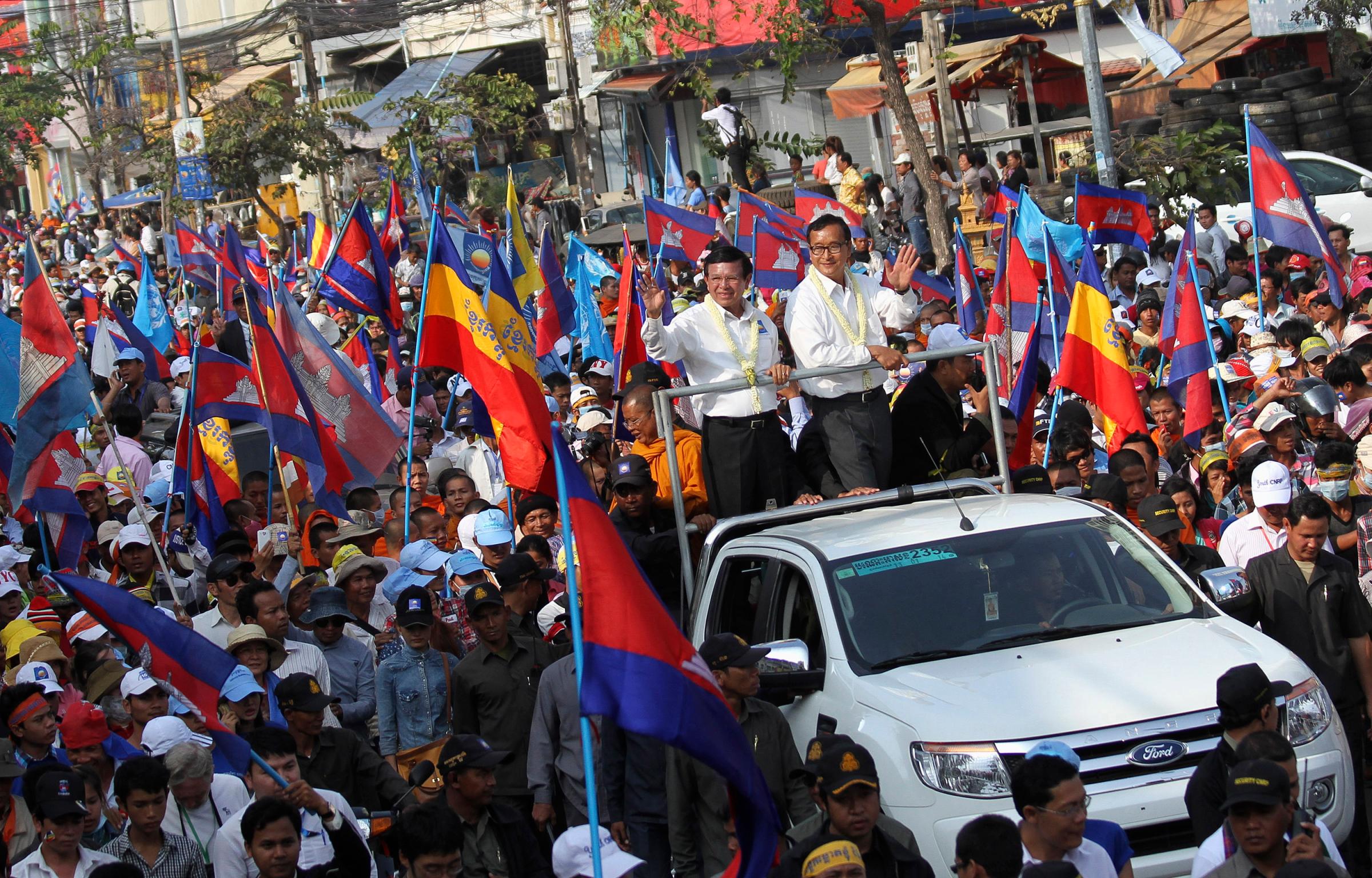
The leader of Cambodia’s political opposition sits in solitary confinement in Correctional Center 3, a maximum-security prison near the Vietnamese border.
Kem Sokha, the president of the Cambodia National Rescue Party (CNRP), was seized in a Sept. 3 midnight raid on his home in Phnom Penh, the country’s capital, 130 miles away. Since then, he’s been under 24-hour surveillance while he awaits trial for treason. If convicted, he faces up to 30 years in prison.
Kem Sokha’s arrest is “a show of power to demoralize those who want change,” his daughter Kem Monovithya, CNRP’s deputy director-general of public affairs tells TIME from Washington, D.C, where she has been rallying support for her father’s release. Hun Sen, the country’s Prime Minister, “is testing the commitment of the international community and Cambodian public,” she says. “How they react in coming weeks is crucial to the fate of Cambodia.”
Cambodia’s democracy has never been fully free and open. But this year, Hun Sen’s government has conducted a wide-ranging crackdown that many Cambodians and outside observers say is unprecedented. Civil liberties have been curbed, dissenting voices smothered, and human rights advocates and domestic media intimidated ahead of national elections next July. “Normally, repression would come in cycles: the government would crack down, tighten things up before elections, and then loosen the shackles to reset the political situation and derive political benefits,” says Sebastian Strangio, author of Hun Sen’s Cambodia. “What we’re seeing now is the government increasingly dispensing with the pretense of democratic rule and being much more openly authoritarian.”
On Oct. 16, the U.S. State Department said it was “deeply concerned” about draft legal amendments that would disqualify the CNRP from contesting the election. “Genuine competition is essential to democracy and to the legitimacy of the 2018 national elections,” the statement said. Senator Ted Cruz added his voice with an Oct. 23 statement that accused Hun Sen of “endangering the future not only of U.S.-Cambodia relations, but of Cambodian democracy” and threatened travel bans for top government officials.

Cambodia’s modern history has been characterized by conflict and trauma. Between 1975 and 1979, the Khmer Rouge unleashed a reign of terror that claimed the lives of anywhere from 1.8 million to 3 million people — some 20% of the population – by starvation or in nightmarish massacre sites known as the Killing Fields.
The regime was effectively toppled by the invasion of Vietnam in 1979, though it retained control of the western regions of the country through much of the 1980s and 90s. The Paris Peace Accords of 1991 marked the formal end to civil war between the Khmer Rouge and a Vietnam-backed alliance that included the country’s nominal government, led by Khmer Rouge defectors. The Accords also established the U.N. Transitional Authority in Cambodia, a $1.62 billion nation-building effort that saw the U.N. take control of a country for the first time. UNTAC sought to stabilize Cambodia by installing peacekeeping forces, disarming militias, establishing tribunals, and organizing Cambodia’s first elections in 1993.
The result was a coalition government that included Hun Sen’s Cambodian People’s Party (CPP). By June 1997 the coalition had disintegrated into pitched clashes between supporters of the CPP and its partner, the royalist FUNCINPEC party. More than 100 people were killed, and Hun Sen ousted his co-premier and embarked on a bloody purge of his own party and the armed forces. The CPP won the following year’s election, and Cambodia’s 65-year-old strongman has shown no indication of relinquishing the country’s top seat since. In September this year, Hun Sen announced he would “continue [the] job for another 10 years.”
Today, Cambodia, a Southeast Asian nation of 16 million people, is defined by mis-governance, cronyism, and plunder of the country’s natural resources. A 2016 report by Global Witness found that private companies controlled by Hun Sen’s network of friends and allies — 114 of them affiliated with his immediate family alone — allow the regime to exert a “stranglehold” over Cambodia’s key industries, including finance, energy, tourism, and logging. “The Cambodian political system has never really been truly democratic,” says Strangio. “It’s been manipulated and controlled by the CPP quite effectively through a range of subtle and not-so-subtle means,” including “the use of patronage to inculcate loyalty.”
Read more: Strongman Hun Sen Has Cambodia’s Economy ‘Sewn Up,’ Says Report
The last nationwide election in 2013, however, was a turning point in Cambodian politics. While the CPP still won with 49% of the vote, the CNRP made significant and unexpected gains, taking 44% and earning its best-ever 55 seats in the 123-member National Assembly. The 2013 election was “a real shock” for the CPP, says Carl Thayer, a regional security analyst at Australian Defense Force Academy. “[Hun Sen is] upping the repression to make it even more certain that there won’t be surprises” in 2018, Thayer tells TIME.
The impact of this year’s crackdown on Cambodia’s political landscape has been severe. More than half of opposition MPs have fled, including the CNRP’s senior leadership. Mu Sochua, the CNRP’s second-in-command and acting president, left on the evening of Oct. 3, after sources in the Ministries of Defense and Interior warned her that arrest was imminent. The day before, Hun Sen accused “rebels” in the government of attempting a “color revolution.” “I want to confirm that it is not done yet with the arrest of only one person, as there is a cluster,” Hun Sen said, apparently referring to Kem Sokha. Mu spent the night in a safe house and the next afternoon, she made what she called “the toughest choice in [her] life.” She left Cambodia indefinitely. “I don’t intend to be a martyr. I don’t intend to be a hero. I intend to have my voice heard,” she told TIME from Berlin. “If I stay behind bars, who will carry on that message to the outside world?”
Despite the CNRP’s gains, the 2013 election was marred by allegations of “systematic voter fraud”, according to Human Rights Watch. The CNRP refused to take their Assembly seats, and tens of thousands of protesters poured into the streets of the capital Phnom Penh. The government responded with muscle: nonviolent sit-ins were dispersed by plainclothes thugs armed with truncheons and electric cattle prods.
On Oct. 17, the National Assembly voted to redistribute the CNRP’s seats, effectively nullifying the 2013 election. Cambodia’s Law on Political Parties has been amended three times since 2016 to bar parties from associating with criminals — a category that now includes Kem Sokha and his CNRP predecessor Sam Rainsy, who has been in exile in in France since Nov. 2015, avoiding a slew of lawsuits, including a two-year defamation sentence. “Cambodia is at a tipping point,” said Sam Rainsy, in an email to TIME. “What is going on in 2017 is nothing but a constitutional coup.”
“The CPP government is no longer interested in ‘competitive’ elections,” says Lee Morgenbesser, lecturer at Australia’s Griffiths University who studies authoritarianism in Southeast Asia. The government “deliberately dilutes the capacity of opposition parties to win office, intentionally infringes upon civil liberties and regularly abuses state resources to create an uneven playing field,” he told TIME in an email.
As Hun Sen has strengthened his grip on power, human-rights workers, activists and journalists have been hounded by politically motivated lawsuits. More than a dozen radio stations were de-licensed earlier this year for broadcasting Radio Free Asia and Voice of America programs, a key source of independent news for Cambodia’s rural population. (RFA has continued transmitting from outside the country, as it does for Tibet and North Korea.) An American nonprofit, the National Democratic Institute, was also shuttered, allegedly for falling afoul of a controversial 2015 NGO law that rights monitors cautioned was too broad and vulnerable to abuse.
The Cambodia Daily, one of the country’s two independent English-language newspapers, shut its doors in September after being saddled with a $6.3 million tax bill and a one month deadline. The paper, which for 24 years had been a critical source of coverage on sensitive topics including corruption and land use, published its last issue on Sept. 4 and had covered Kem Sokha’s arrest the previous night. The front page of the paper’s final edition was emblazoned with the words, “Descent Into Outright Dictatorship.”
Read more: ‘Going Down In a Blaze of Glory.’ The Brief, Crusading Life of the Cambodia Daily
Condemnations have poured in from Western embassies and observers for months. In February, the ASEAN Parliamentarians for Human Rights called the party law amendments “the death knell for democracy” in Cambodia. Others, including Mu Sochua, have called for asset freezes and targeted sanctions. “The time for statements has passed,” she told Reuters. “How long can the international community wait?”
A resolution by U.S. Senators John McCain and Dick Durbin urged the State and Treasury Departments to add Cambodian officials to the Specially Designated Nationals list, which prohibits travel to the U.S. But Washington and the international community do not have as much leverage over Phnom Penh as before. As foreign aid budgets have shrunk, the country has drifted into the orbit of another, rights-averse ally: China. Beijing has heaped funds on Cambodia in recent years. Bilateral trade accounted for $4.8 billion in 2016, equivalent to one-fifth of Cambodia’s GDP, with another $12 billion in Chinese investment. In exchange, Cambodia has proven itself a willing and unquestioning supporter in international forum, in particular blocking condemnations from ASEAN of China’s territorial gains in the South China Sea. “China will pick up the tab,” says Thayer. “The bottom line is that Hun Sen has nothing to fear.”
In January, Cambodia suspended joint U.S. military exercises for what would have been their eighth and ninth years; in 2016, it held naval exercises with China for the first time. Then in April, Cambodia booted out a unit of the U.S. Naval Construction Battalions that carry out humanitarian work, which have been present in Cambodia for nine years.
Some Cambodians are still trying to fight back through politics. The CNRP may have been marginalized, but new parties and political groups are emerging. One of them, the Grassroots Democracy Party (GDP), was founded in August 2015 by the prominent government critic Kem Ley, whose brazen daylight assassination a year later “signaled the end of [Cambodia’s] halfway house for political rights and civil liberties,” says Morgenbesser. While the party is small — it won just five seats local elections this past June — it plans to field candidates in 2018.
It will be a grueling struggle. “To challenge the ruling party is not an illegal act to topple the government,” says GDP president Yeng Virak. “But democracy in Cambodia has been derailed. We are really back to square one.”
More Must-Reads from TIME
- Donald Trump Is TIME's 2024 Person of the Year
- Why We Chose Trump as Person of the Year
- Is Intermittent Fasting Good or Bad for You?
- The 100 Must-Read Books of 2024
- The 20 Best Christmas TV Episodes
- Column: If Optimism Feels Ridiculous Now, Try Hope
- The Future of Climate Action Is Trade Policy
- Merle Bombardieri Is Helping People Make the Baby Decision
Write to Eli Meixler at eli.meixler@time.com